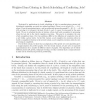Free Online Productivity Tools
i2Speak
i2Symbol
i2OCR
iTex2Img
iWeb2Print
iWeb2Shot
i2Type
iPdf2Split
iPdf2Merge
i2Bopomofo
i2Arabic
i2Style
i2Image
i2PDF
iLatex2Rtf
Sci2ools
APPROX
2006
Springer
2006
Springer
Weighted Sum Coloring in Batch Scheduling of Conflicting Jobs
Motivated by applications in batch scheduling of jobs in manufacturing systems and distributed computing, we study two related problems. Given is a set of jobs {J1, . . . , Jn}, where Jj has the processing time pj, and an undirected intersection graph G = ({1, 2, . . . , n}, E), with an edge (i, j) whenever the pair of jobs Ji and Jj cannot be processed in the same batch. We are to schedule the jobs in batches, where each batch completes its processing when the last job in the batch completes execution. The goal is to minimize the sum of job completion times. Our two problems differ in the definition of completion time of a job within a given batch. In the first variant, a job completes its execution when its batch is completed, whereas in the second variant, a job completes execution when its own processing is completed. For the first variant, we show that an adaptation of the greedy set cover algorithm gives a 4-approximation for perfect graphs. For the second variant, we give new o...
| Added | 20 Aug 2010 |
| Updated | 20 Aug 2010 |
| Type | Conference |
| Year | 2006 |
| Where | APPROX |
| Authors | Leah Epstein, Magnús M. Halldórsson, Asaf Levin, Hadas Shachnai |
Comments (0)

